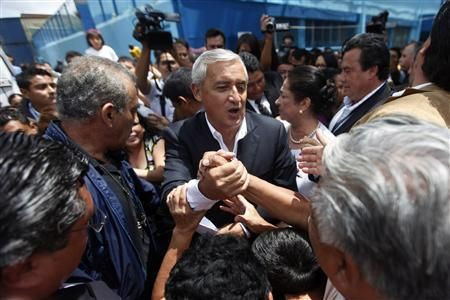
In a shocking turn of events at the genocide trial of former general Efrain Ríos Montt, a former soldier has implicated Guatemala's current president, Otto Pérez Molina, in atrocities committed during in the early 1980s during the then-ongoing civil war. Before being elected president as the candidate from the conservative Patriotic party, Pérez Molina made his military career as an intelligence specialist and eventually retired as general.
Rios Montt is accused of ordering the massacre of at least 1,771 indigenous Mayans in the El Quiche department of Guatemala during the military dictatorship he headed from March 1982 to August 1983. It is the first ever genocide trial to be held in the courts of the same country where the alleged crimes were committed.
President Pérez Molina was implicated by Hugo Reyes, 47, who testified by video from an undisclosed location. Reyes said he came to Nebaj -- the Mayan village in El Quiche where the crimes took place -- while working as a mechanic in an engineering brigade of the national army. Reyes told the court that Pérez Molina, an army major at the time, ordered soldiers to burn and loot "in order to later execute people." He said he knew the commanders, including Pérez, because they also were in charge of the engineering unit.
Reyes also described one massacre, one of countless gruesome incidents heard over the course of the trial.
"The people who were to be executed arrived at the camp beaten, tortured, their tongues cut out, their fingernails pulled out."
As president, Pérez Molina, is protected from subpoena by an amnesty given to public officials, according to the Guardian. "I have nothing to hide. I did not participate in a single situation where someone died that was my responsibility," he told reporters on Friday. "I'm not going to deny that I was in Nebaj; it's true. But I was there to rescue the civilians, combat the armed guerrillas and help the civilians."
In 1996, Pérez Molina helped negotiate the peace accords, garnering himself a reputation as a moderate military leader. He won the presidency in 2011 on a platform of law and order in a country where many regions are being terrorized organized crime-related violence. He has long insisted that no genocide took place.
According to the Council on Hemispheric Affairs, about 200,000 Guatemalans were killed and 45,000 more "disappeared" during the civil war between leftist guerrillas and the US-backed military governments, which lasted from 1960 through 1996. Some 93 percent of those killed were at the hands of State security forces.
© 2025 Latin Times. All rights reserved. Do not reproduce without permission.




